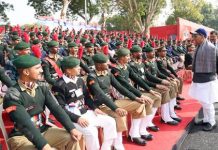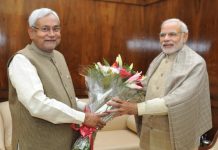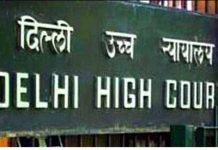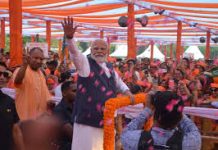A Tehelka SIT report on voter data trading raises questions about the integrity of democratic processes, such as voting, and protection of citizens’ privacy.

“I can provide you with personal data of the judges of Supreme Court, High Court and Lower Court. Additionally, I have data on lawyers, doctors, teachers, engineers, students, and corporate houses for the ongoing 2024 general elections. I’ve been in this business for the last 5-6 years. If you need data for 50,000 people from your constituency, the cost would be Rs 90,000. But before committing, I’ll provide you with a sample to verify the accuracy of my data,” said Animesh Kumar, a vendor working in a digital marketing company with its office in Noida.
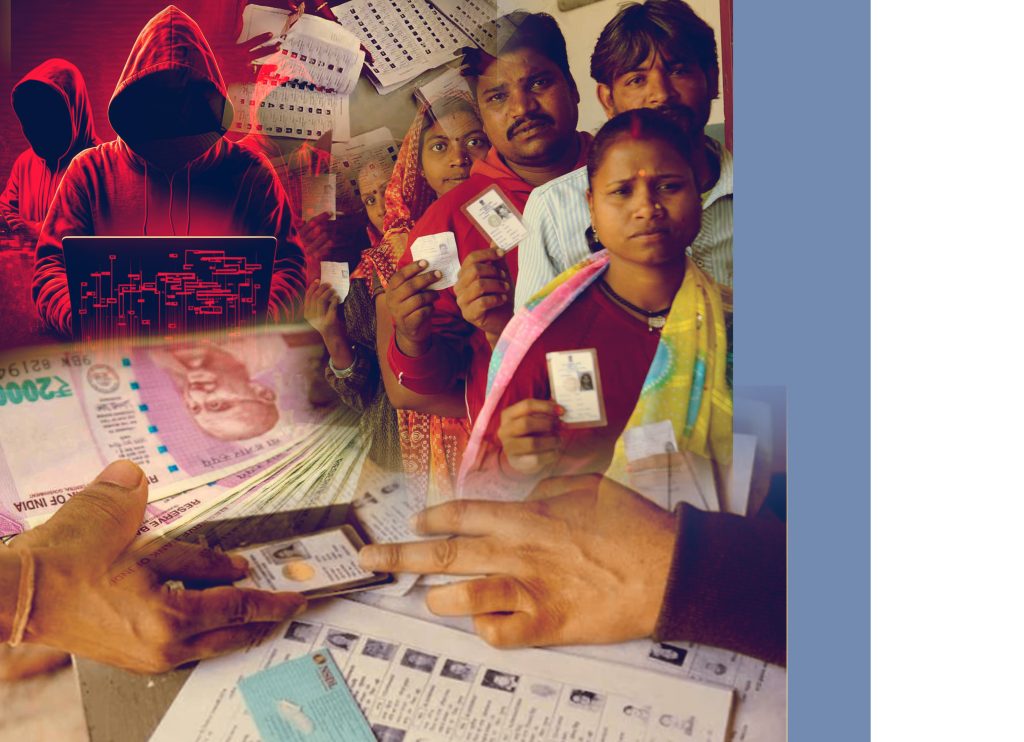
Animesh came to meet us at a five-star hotel in Delhi to discuss the voter data he can provide for our fictitious candidate contesting the Lok Sabha elections from Agra, Uttar Pradesh. In today’s political landscape, data is king—it can determine victory or defeat in any Indian election. We’ve all heard stories of voter data being sold to interested political parties and their candidates during elections. The on-going 2024 general elections are no exception. After the official announcement of the elections, vendors are back in the business, offering voter data to interested parties at a price.
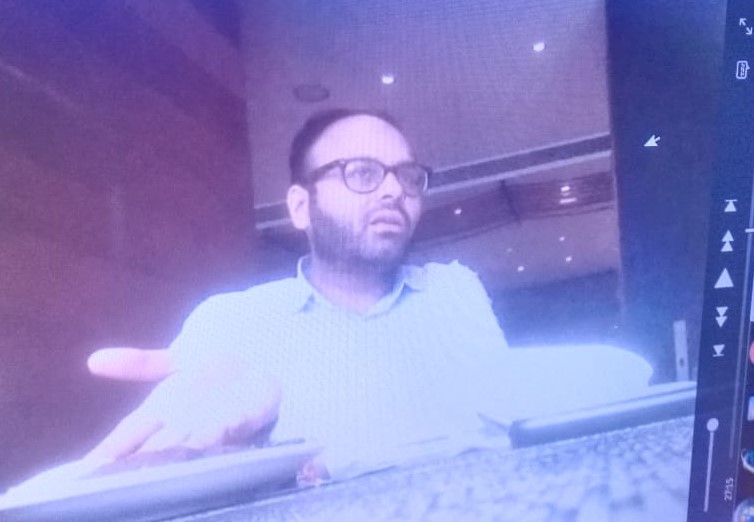
As Tehelka embarked upon a much-needed investigation into vendors selling voter data for a price, we discovered, to our surprise, numerous vendors offering personal data of voters, complete with different packages that include mobile numbers, addresses, and names. Our correspondent, posing as potential client who is seeking digital company’s services for a candidate who will be contesting the 2024 Lok Sabha election from the Agra seat, met with Animesh. Animesh was introduced to us by another vendor, Niranjan Kashyap. Both Animesh and Niranjan work in separate digital marketing companies, but they met us in their personal capacities, and not as representatives of their respective firms. Animesh informed us that he manages personal clients who seek voter data in addition to his regular job.
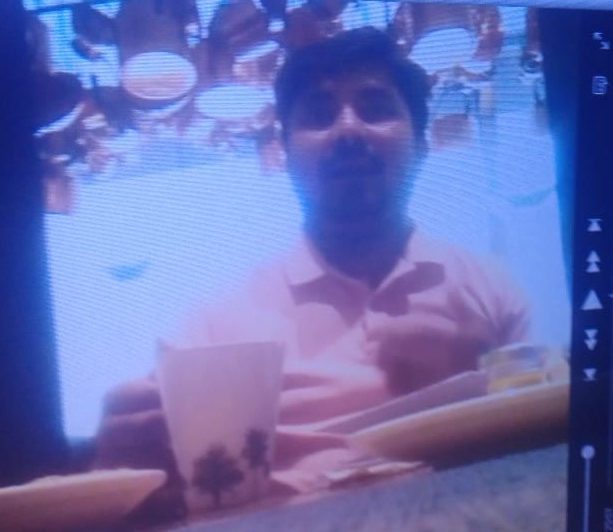
Before delving into what Animesh and Niranjan offered us, let’s take a closer look at how significant the data-selling business has become in India, particularly during elections. In 2018, a controversy erupted in India when the UK-based Cambridge Analytica, a controversial data analytics firm, was revealed to have extensively worked for the Congress party in India, with Congress as its client. Whistle-blower Christopher Wylie made this claim while testifying before the UK Parliament. The political consultancy, as stated on its website, had worked on the Bihar assembly elections in 2010, and its clients secured a landslide victories. Fast forward to 2023, when seven individuals were arrested for stealing and selling personal data of 17 crore Indians in Hyderabad. Then, in January 2024, cyber security firm Cloud SEK revealed a startling fact: data of 750 million telecom users in India was being sold on the dark web. This breach included critical details such as names, mobile numbers, addresses, and Aadhar numbers. Even during last year’s Karnataka elections, a private firm in Bengaluru was found to be selling data of lakhs of voters to candidates in the fray. The Election Commission of India is actively investigating this case.
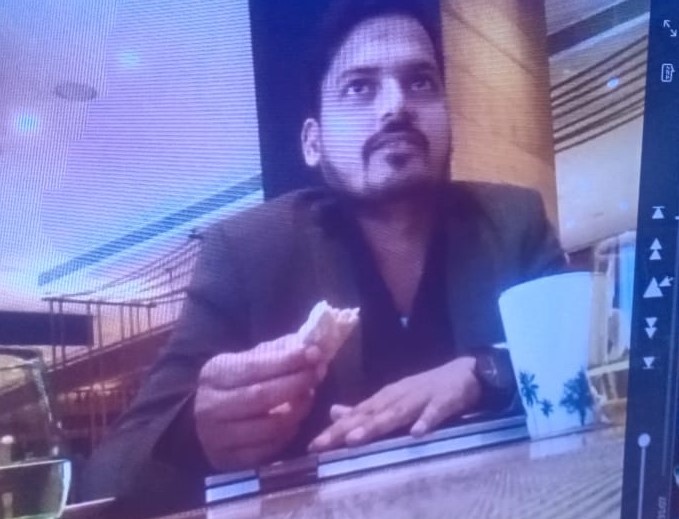
Now, coming back to Animesh, we told him that we need personal data of lawyers and the judges of supreme court, high court and lower court. He agreed to supply their data for the elections.
Reporter- Jaise maan lijiye hame wakilon ka data chaiye, judges ka ?
Animesh- Haan mil jayega total cheez ka.
Reporter- High court aur supreme court ke judges hain.. lower court ke..unka mil jayega ?
Animesh- Haan mil jayega
Reporter- Unki kya kya jaankari mil jayegi ?
Animesh- Jo cheez yahan par hai wahi mil jayegi
Reporter- Phone number, address..?
Animesh- Haan
Reporter- To aap data mujhe dogey kaise?
Animesh- Data hum excel sheet mein dengey..
[Animesh’s conversation with our correspondent indicates readiness on his part to provide a wide range of personal data, including information on lawyers and judges. His assurance that all required information will be available indicates depth of his access to the data.]
Furthermore, Animesh revealed that he can provide data on various professionals such as doctors, teachers, principals, students, and more. He specified that he would furnish a sample data-set for us to authenticate before proceeding with any transaction. Importantly, he emphasized that the individuals whose data he provides would remain unaware of its sale.
Reporter- To aise to aur bhi data nikal kar de dogey ?
Animesh- Haan
Reporter- Kis- kis ka data nikal saktey ho ye bata do?
Animesh- Jis-jis ka chahiye ho nikal saktey hain…marketing se related..har cheez ka data nikal saktey hain..engineer ka doctors ka total.
Reporter- Kitne doctors hai, hame mail bhejna hai..data mein unka kya kya mil jayega..
Animesh- Wahi email..
Reporter- Accha number wagera nahi milega?
Animesh- Number chahiye to one by one..find karna padega tab number hoga..naam, number, mail-Id, unka address.. sab..
Reporter- Nahi agar hum aapko ek contract de dein ki humko itne logon ka data chahiye aur data mein hame mail id chahiye, unka phone number.. mil jayega ?
Animesh- Haan
Reporter- Ye aap tie up karlo hamare saath.. Ab aap batao kis kis cheez ka data aap nikal saktey ho hamare liye…?
Animesh- Aapko kis kis cheez ka data chahiye..dekhiye koi bhi industry ho..for example doctors ka data ho gaya, school ka ho gaya, teacher ka ho gaya, hum pehle particular kuch samples aapko send karenge aap usko check kijiye.
Reporter- Hame aap schools ka de dijiye..wahan ke principal, teachers, bacchon ka..usmein unke ghar ke address, telephone numbers, unke mail id ..teen cheezein..
Reporter- Accha inka aap data nikalenge to unko pata to nahi chalega.?
Animesh- Nahi…abhi aap dekh saktey hain example aapko bhej rahe hain…nahi uske liye doosra tool hota hai…tool hota hai uske through humlog data detey hain..
Reporter- Theek hai
Animesh- Simple hai.. ya to hum aapko whatsapp kar denge ya inko share kar denge.. uske baad aap check kar lijiyega uske baad aagey phir…
Reporter- Iska kharcha kitna hoga ?
Animesh-. Ye sab cheezein dekhkar na, quotation hum aapko, kitna data chahiye, uske anusar hum aapako….pehle aap sample check kar lijiyega..uske baad confirm kijiyega.
Reporter – Matlab pehle aap sample bhejogey ?
Animesh- Haan hum aapko sample bhejengey.. usmein aapko check karna hoga.. data sahi hai ya nahi
Reporter- Hum kaise check karenge ..cross check kaise karenge hum..?
Animesh- Jaise hum data nikale, HR ko share karenge usmein doctor ka hoga, usmein poora particulars hai ya nahi hai..wo aap google par bhi dalkar check kar saktey hain na..ussey aapko poora detail pata chal jaye..
[Animesh’s willingness to provide extensive data on various professions and his assurance of confidentiality raises serious ethical concerns. This conversation highlights the ease with which personal information can be accessed and traded, emphasizing the need for stringent regulations to protect individuals’ privacy and prevent misuse of their data.]
Expanding on his offer, Animesh informed us that he could supply data encompassing multinational companies, their employees, chartered accountants, GST registered offices, and more in the Uttar Pradesh area, where our supposed constituency is located.
Reporter- Accha ye to wo cheez ho gayi jo hame chahiye, iske alawa aap hame aur kaun kaun si cheez ka data provide karwa saktey hain ye bata dijiye, jissey mein unse pooch loon?
Animesh- Jo aapko chahiye iske alawa office staff ka ho jayega.
Reporter- Office staff ka?
Niranjan- Jaise companies ho gayi, MNCs ho gayi, jo companies UP side mein hain..jo employees working hain..
Reporter- Kis company mein kitne employee working hain unka data..
Niranjan- Employees ka ho gaya.. iske baad CAs ka.. GST registered office
Reporter- GST register matlab?
Animesh- GST registered office jo hota hai na un sabka data bhi aapko mil jayega….government data job hi hai, total cheez mil jayegi aapko
[The discussion reveals the extensive range of data Animesh can provide, including information on office staff, employees of companies, chartered accountants, and GST registered offices. His breadth of available data underscores the magnitude of information accessible through his channels, raising further concerns about the potential misuse of personal and corporate information. ]
Animesh also pledged to provide us with data from private banks, noting that accessing government bank data is challenging due to their tighter security measures compared to private banks. His explanation reveals the disparity in accessibility between government and private bank data, with government bank data being harder to obtain due to tighter security measures.
Reporter- Accha bank ka data mil sakta hai..?
Animesh- Bank ..haan.
Reporter- Govt, private dono ka?
Animesh- Government ka to nahi mil payega.. lekin private ka..
Reporter- Govt mein dikkat kyun..?
Animesh- Govt ka public domain mein nahi aata.
Reporter- Aisa kyun?
Animesh- Aisa wahan se band kiya jata hai.
Reporter- Private wale kyun nahi band kartey?
Animesh- Private wala apna saksham hai.
Reporter- Phir to private bank mein khata khulwana bekaar hai.?
[Animesh’s acknowledgment of the limitations in accessing government data underscores the complexities involved in sourcing certain types of information, highlighting the need for increased transparency and regulation in data handling practices within the banking sector.]
On camera, Animesh admitted to Tehelka that selling data is illegal and prohibited, stating that even obtaining data from Google is against the law. He bragged that despite the illegality, he has never been caught for selling data, emphasizing that nothing is private in actuality, as everything is available for sale.
Reporter- Data dena allowed nahi hai aisey.?
Niranjan- Nahi
Reporter- Illegal hai..?
Animesh- Aisey hi data bechne lage to..
Reporter- To aap ye Google se nikalogey to ye bhi to allowed nahi hai.?
Animesh- Allowed nahi lekin wahan se hamey mil jata hai..
Reporter- Kabhi koi dikkat to nahi aayi aapko, kisi ne pakad liya ho?
Animesh- Nahi aisa nahi hua
Reporter- Matlab koi bhi cheez jo hai hamari wo private nahi hai…har cheez bazaar mein bik rahi hai ?
Animesh- Haan
[The conversation with Animesh and Niranjan underscores the illicit nature of data selling as they acknowledged its illegality. Animesh’s admission that data can be obtained from sources like Google despite being unauthorized highlights the pervasive nature of data exploitation.]
Now, Animesh revealed that he has been involved in the data business for the past 5-6 years. During our interaction, he demanded Rs 90,000 from us in exchange for the personal data of 50,000 voters for the upcoming elections, reaffirming his involvement in the data-selling industry.
Reporter- Kitne time se aap ye data ka kaam kar rahe hain..?
Animesh- 5-6 saal se.
Reporter- Phir bhi ek idea kitna kharcha hoga..tentative ?
Animesh- Aapko kitna data chahiye..kareeb 1 lakh, 50,000?
Reporter- 50,000 mil jaye agar..dono ka bata do 1 lakh or 50 ka?
Animesh- Jaise 50,000 ka hai na to aapko 90 hazar ke as pass padega.
Reporter- 90 hazar..ek cheez ka?
Animesh- Nahi
Reporter- Sab ka ismein sab ka data hoga.. doctor, engineer, teacher?
Animesh- Haan- haan.
Reporter- Sari cheezein hongi total 90 hazar mein..to aapne data nikala hai pehle kabhi ?
Animesh-Yehi mein kaam karta hoon ji.
[The conversation with Animesh sheds light on his extensive experience in the data business spanning 5-6 years. His confirmation of providing data for a fee of around Rs 90k for Rs 50000 voters emphasizes the commercialization of personal information, highlighting the ethical and legal complexities surrounding data trading in electoral processes.]
Our investigation now shifts focus to a second character, Rohan Mishra, the co-founder of Tramt Technology Private Limited, a company established seven years ago with its headquarters in Noida. Tramt specializes in providing digital marketing solutions to businesses of all sizes. During our investigation, we received a call from Tramt inquiring about our purpose. Upon explaining that we were seeking brand building for a candidate contesting the 2024 General Election from Uttar Pradesh, Rohan, accompanied by his associate, Smita, agreed to meet us at a five-star hotel in Delhi.
During the meeting, Rohan assured us that he could procure data for the voters in our candidate’s constituency that was not publicly available. He specified that whatever data we required would be arranged for us, provided we informed him 24-48 hours in advance. Furthermore, he mentioned that the data would be handed over to us on a pen drive rather than being transmitted online.
Reporter- Accha kuch data hum log aapse purchase karna chahe, mil jayega?
Rohan-Mil jayega.
Reporter- Mil jayega..
Rohan- 24 to 48 hrs ka time dena padega…uska ek pen drive milega, online nahi milega.
Reporter- Accha aur kis level ka data mil sakta hai?
Rohan- Jo chahiye mil jayega..
Reporter- Matlab aisa data na ho jo easily available hai online
Rohan- Milega nahi.
Reporter- Wo nahi chahiye
Rohan- Nahi milega kahin nahi milega.
Reporter- kya cheez?
Rohan- Jo aap keh rahe ho market mein easily milega bhi nahi..
Reporter- Main ye keh raha hoon jo easily available hai online wo to hum hi le lenge..
Rohan- Phir mera kya kaam, hum wo hi denge jo nahi milega..
Reporter- Hame wo chahiye jo available nahi hai online.
[Rohan Mishra sounded sure footed as he assured us of providing data within 24 to 48 hours, emphasizing that it will be delivered on a pen drive rather than online. His preference for using a pen drive instead of an online delivery method is part of his risk mitigation strategy.]
Meanwhile, Rohan advocated for a controversial strategy, suggesting that the most effective method of promoting our candidate in the elections is by tarnishing the image of our rival candidate while simultaneously presenting our candidate in a positive light to the voters. He claimed that by the time the rival candidate becomes aware of our scheme, our objectives would have been achieved, with the Election Commission of India remaining oblivious to our actions
Reporter- Jo tareeka aapne bataya usmein best tareeka kaun sa hai.?
Rohan- Best tareeka wohi hai sir PR wala ek ko girao, doosre ko uthao..
Reporter- Kya bola aapne ?
Rohan- Ek ko neeche girao, negative bhi positive bhi sabse best ye hai..
Reporter- No 1 matlab jo saamne candidate hai ?
Rohan- Usko negative karo aur apne aap ko highlight karo.
Reporter- Ismein Rohan bhai ye bhi to ho sakta hai jab hum saamne wale ko negative karengey to wo bhi to hum ko kar sakta hai..?
Rohan-Jab tak pakdega, game khatam..
Reporter- Ismein thoda sa issue ye bhi ho sakta hai, EC ki guidelines hain. Fake news aur misinformation ke khilaf..usmein hum log na pakde jaaye to?
Rohan- Nahi pakde jayenge..isliye to mein pooch raha hoon kiske liye karna hai, apko idea mil jayega.
[Rohan’s non-chalant response regarding the potential repercussions from the Election Commission and the possibility of retaliation from the targeted candidate brings to fore ethical and legal concerns surrounding negative campaigning and misinformation in elections.]
At this juncture, Rohan confessed that he also dabbles in Artificial Intelligence (AI)-generated deepfake technology. He offered to make one deep fake for us, with the charges to be discussed later. However, he advised against opting for deepfake due to the inherent risk of detection.
Reporter- Aap deepfake bhi karwate hain kya?
Rohan- Deepfake mein aajkal pakda jata hai…pakde gaye na to aapke liye nuksaan hai..
Reporter- Matlab bann sakta hai?
Rohan- Kisi ka bhi bann sakta hai..
Reporter- Waise aap chaho to bana dogey, kitni der ka kaam hai..?
Rohan- Depend karta hai
Reporter- Charges?
Rohan- Bata dunga
[Rohan’s acknowledgment of dealing in deepfake technology gives credence to the ongoing debate over its potential for misuse and the risks associated with such manipulation. The need for vigilance and regulation in the realm of digital deception cannot be overstated.]
Once again, Rohan reiterated his offer to provide data for our voters, emphasizing that none of it is available online; instead, it is all obtained through clandestine means. He mentioned his capability to procure Aadhar data, which contains comprehensive details of cardholders. Rohan is of the view that our constituency required data for 10 lakh people.
Reporter- Data kahan se aayega..?
Rohan- Data mil jayega, Aadhar ka jo data rehta hai na, uska naam number uska address.. kitne number us Aadhar par updated hain, 4-5 number wo saare aapke pass aa jayenge..
Reporter- Aapke pass data hai ya aap kharidogey?
Rohan- Kharidenge, kisi k pass nahi hain..
Reporter- Matlab ismein to lakho mein chahiye hoga data.?
Rohan-Haan 10 lakh, 5 lakh, 7 lakh..
Reporter- Haan kyunki itni badi Lok Sabha constituency hai…
Rohan- Haan mil jata hai..
Reporter- Kuch aisa data bhi hai jo aapko online nahi milega.?
Rohan- Nahi mil jata hai, online kuch nahi milta..purchase karna padta hai backdoor se, uska tareeka hota hai..
[Rohan’s discussion unveils the clandestine nature of data procurement. His assertion that such data cannot be obtained online underscores the covert methods employed to access sensitive information, raising serious concerns about privacy and data security in electoral processes.]
As the investigation progressed, we encountered the third character in this story: Gaurav Maggo, the director of Seoage Digital Marketing Private Limited, headquartered in Dwarka, New Delhi. When we inquired whether he provided voter data, he explained that he purchases data from vendors and offered to connect us with these vendors.
Reporter- Aap data provide nahi karte?
Gaurav- Data hum log provide nahi karwatey.. mein arrange kar dunga..aap ussey baat kar lena..
Reporter- Matlab personal data mil jayega?
Gaurav- Mein aapko banda arrange kar dunga..third party hotey hain ye log.. hum bhi third party letey hain…mein aapko provide kar dunga,
Reporter- Kitna personal data mil sakta hai..?..
Gaurav- Ye to mere ko nahi pata..jo banda aayega, aap baat kar lena.
Reporter- Abhi tak aapne karaya to hoga
Gaurav- Sir dekho, hum deal nahi karte hum banda provide kartey hain.kyunki hum to services par hain insta services pe, in cheezon par jayenge to sara din kharab hoga.
[Gaurav reveals his role as a mediator in data procurement, as he emphasizes that he arranges for data through third-party vendors rather than directly providing it. His reluctance to specify the quantity of personal data available hints at the clandestine nature of such transactions.]
Gaurav now offered to provide us with contact numbers of 3-4 vendors who specialize in providing voter data. These vendors, he assured, would supply data pertaining to the voters of the Uttar Pradesh constituency from where our candidate is contesting.
Reporter- Kis level ka data hame mil jayega?
Gaurav- Sir aapko local chahiye hoga, elections ka wo to mil jayega, jo banda hoga wo hi aapse baat karega
Reporter- Wo Delhi ka hi hoga banda?
Gaurav- Sir depend karta hai.. UP ka bhi ho sakta hai..3-4 vendors hain hamare pass jo attached hain..un charon ka number mein aapko de dunga..
Reporter-Theek hai lekin Delhi mein meeting kar lega wo.?
Gaurav- Delhi mein meeting kar saktey hain.
[Gaurav’s assurance of connecting us with vendors who may be based in Uttar Pradesh highlights the importance of local contacts in accessing relevant voter data.]
As we draw to a close in this report, it is worth noting that Tehelka’s investigation into the sale of voter data marks a significant milestone in exposing the illicit practices surrounding electoral campaigns. The readiness of all three vendors to sell voter data without the consent of the individuals concerned highlights the urgent need for comprehensive data protection legislation in India. The absence of a Data Protection Bill underscores the gaps in regulatory frameworks, leaving individuals vulnerable to privacy breaches. While the prospect of a robust data protection law offers hope, the challenges of enforcement persist, emphasizing the ongoing struggle to safeguard individuals’ digital rights.
As elections evolve in the digital age, the unchecked proliferation of voter data trading raises serious questions about the integrity of democratic processes and the protection of citizens’ privacy. Our investigationhighlights the pressing need for policymakers to address these concerns and enact legislation that effectively safeguards individuals’ data rights while preserving the democratic fabric of the nation


